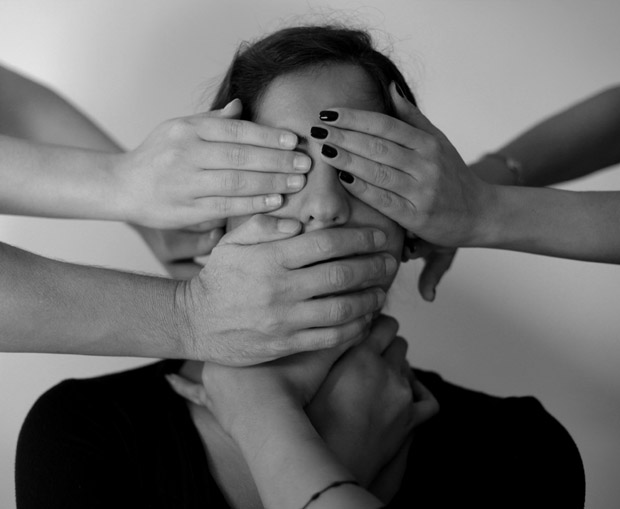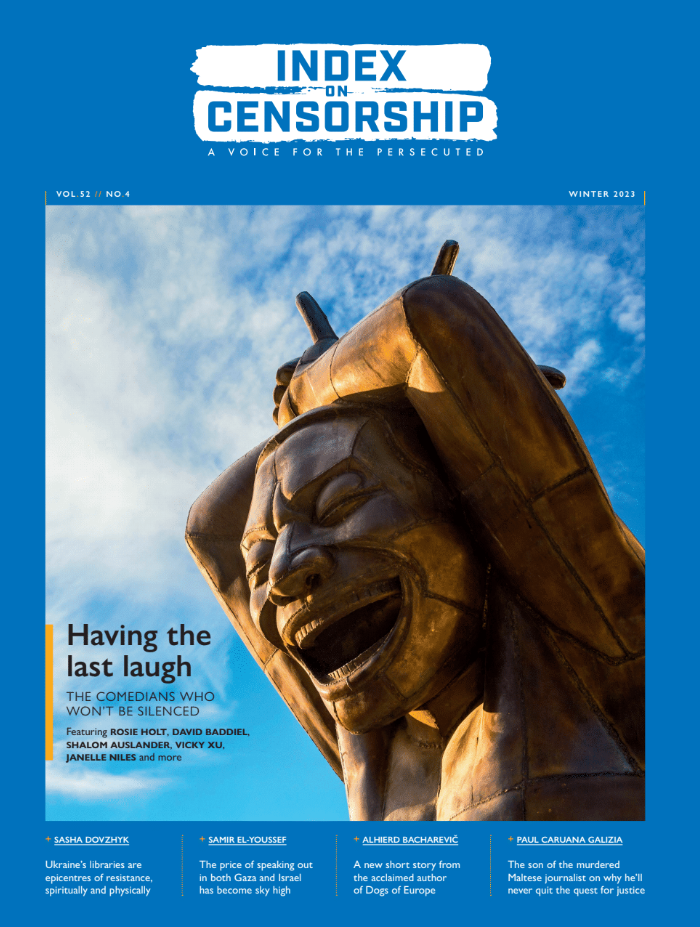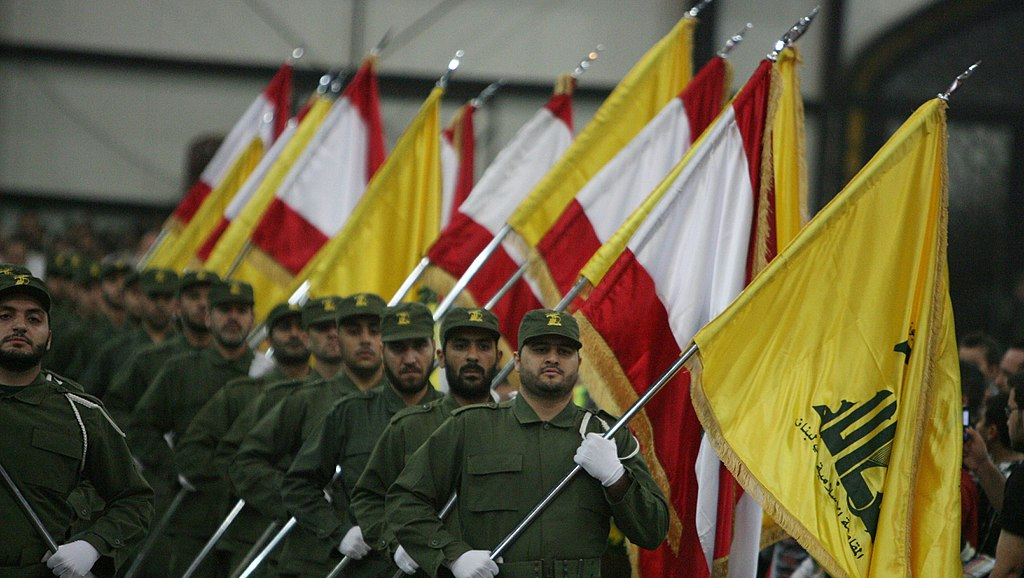When writer Lucien Bourjeily made censorship the theme of his latest play, he knew he was in for a battle. And he was right. His play about censorship ended up being banned. Not surprisingly, he thinks this decision tells its own story about Lebanon today.
“Because the censorship law in Lebanon is so vague and elusive,” he says, artwork that might have received approval two years ago are “censored or banned today”. “In this climate of fear,” he adds, “the military obviously becomes more present in day-to-day life, tightening security (through countless check points in almost every corner of Lebanon) and tightening their grip on freedom of expression. For the near future, I fear that we will be hearing about more bans, more censorship, and more constraints on freedom of speech in Lebanon: censorship thrives when the state feels insecure or when it makes the common mistake of correlating security and freedom of expression.”
On 28 August, he was summoned to the Lebanese Censorship Bureau and told that his play, Will It Pass or Not?, could not go ahead. The play, which tackles the theme of censorship head on, poses the difficult question that any Lebanese artist who explores controversial or sensitive issues must consider. Prior to Bourjeily’s encounter with the interior ministry, the play was performed on university campuses to invited audiences instead of theatres. Members of the censorship board attended and broke up the performance, even though a loophole in the law meant that the play could legally be performed in the venue. So Bourjeily decided to test the board and submitted the play for their consideration. On 3 September 2013, the censorship board’s General Mounir Akiki appeared on television, presenting evidence from four so-called “critics” who insisted the play had no artistic merit and therefore would not be passed. Often, the board will recommend changes that will make an artistic work more palatable – a line removed, the omission of controversial material. But in this case, the play was simply rejected. Index decided to publish an extract of the play so readers could make their own minds up.
In this extract from Will It Pass or Not?–published for the first time in English–Lucien Bourjeily exposes the ridiculousness – and arbitrary nature – of the Lebanese Censorship Bureau, which commonly bans material that is deemed to be obscene, offensive to religions or politically sensitive. Use of this translated script is copyrighted, please contact the magazine editor at Index about use of this material
Scene 2
Sergeant Da’ja, 35, is at his desk, looking through some papers. Kareem, 27, a director, is sitting on a chair next to the desk
Kareem raises his hand.
Sergeant Da’ja How long have you been waiting?
Kareem About an hour.
Sergeant Da’ja What have you got?
Kareem A screenplay.
Sergeant Da’ja Go on then, show me.
Kareem Please, here you are.
Kareem passes Da’ja the screenplay.
Sergeant Da’ja You’ve been here before, haven’t you?
Kareem Yes, I submitted a request, but it just got sent back. Someone from your office contacted me.
Sergeant Da’ja Okay. But I can’t do anything with it. Revisions are done by Captain Shadid.
Kareem Can I see Captain Shadid?
Sergeant Da’ja When the Captain is willing to see you. You’ll have to wait.
Kareem I’ll wait.
Captain Shadid, 40, enters the room. Da’ja stands to attention.
Sergeant Da’ja Good day to you, sir.
Flustered, Da’ja shuffles his papers. Kareem raises his hand again but Da’ja ignores him. Da’ja enters the Captain’s office, stamps his foot on the ground and gives a military salute.
Captain Shadid What have we got today, then?
Sergeant Da’ja The Sun newspaper, as usual, sir.
Da’ja hands the newspaper to the captain.
Captain Shadid Madame Noha again, I suppose…
Sergeant Da’ja As usual, sir.
Captain Shadid Have you even read it, you little shit? No, no, no…Just the same old rubbish. Goodness me … What am I to do with her?
Sergeant Da’ja You know best, sir.
Captain Shadid Okay, what else have we got today? Are there many waiting out there?
Sergeant Da’ja There’s someone outside who’d like to speak to you … about his film script. It’s the tedious one about sectarianism in Lebanon and the guys who go to India and set up a secular state … and all that nonsense.
Captain Shadid Yes, yes, I remember. Show him in …
Sergeant Da’ja Yes, sir.
Da’ja stamps his feet and salutes, then leaves the room. Captain Shadid makes a phone call.
Captain Shadid Hi, Noha. Where are you? Come in to my office, please. I’d like a word.
Da’ja goes back to writing on his papers. Kareem raises his hand again.
Sergeant Da’ja Again? You’re an inquisitive type, aren’t you? Always asking questions… Okay, you can go in now.
Kareem enters Captain Shadid’s office. Captain Shadid is on the phone. He gestures to Kareem to give him the screenplay and then sit down.
Sergeant Da’ja Hello, sir. Er, one thing, sir. About your son?
Captain Shadid Yes, what about him?
Sergeant Da’ja There’s a match at 4pm today. Barcelona–Madrid. Who’s going to take him?
Captain Shadid Isn’t there anyone here? Isn’t Sobhi here?
Sergeant Da’ja Yes, Sobhi’s here.
Captain Shadid Well, send Sobhi then.
Sergeant Da’ja Yes, sir. Right you are, sir.
Captain Shadid Mr Kareem.
Kareem Yes, captain?
Captain Shadid Is this your first film?
Kareem It’s the first one I’ve decided to film, yes. It’s taken me three years to write the script.
Captain Shadid Three years and this is what you’ve got to show for yourself?
Kareem It means a lot to me. What do you mean by “this”?
Captain Shadid Listen, there’s something I want to tell you. I’m saying this to you like a brother to a brother. So, this film of yours … I’m afraid it just isn’t up to scratch. The script was 120 pages. But we’ve had to do quite a lot of work on it and it’s got a bit shorter … But it’s turned out great. Let’s take the title, to start with … I mean, how dare you use a name like that? Fucked Up until Judgment Day? Did you really think that was acceptable? Really? Where did you get that idea?
And then there’s the swearing … We counted it all up: you’ve got “fuck you” four times and “you son of a bitch” 14 times. I mean, do you really think that’s reasonable?
Kareem It’s meant to show this guy’s personality: he talks a lot of crap. It’s “dramatic tension”… it’s meant to reflect real life. People do speak like that in real life, captain.
Captain Shadid Lots of people do all kinds of things but it doesn’t mean it gets our approval, my dear man. We really couldn’t condone this character … so we’ve cut him out altogether. Dramatic tension or not: there were quite a few other things we’ve had to cut out too … Like the first scene, for example. So these guys storm out of their sectarian community and stand up to the cleric. You show the priest getting up to mischief and the sheikh taking bribes.
And these guys who just run away, off to India … We can’t have it like this. We’ve got to think of our country’s image, too. So we’ve cut out that whole scene. But don’t worry – we’ll replace it with another scene with the same ending … The guys can leave the country, that’s fine … and go to India … but for tourism instead. So we’re just changing the mood a bit. The film’s much nicer this way. Better to have a film showing a nice, pleasant world rather than this ugly nightmare you had originally. Tourists are great, so the whole idea is much nicer than the stuff with the clerics and the corruption and the bribes … And at the same time, this will encourage tourism: after all, Lebanon is a superb touristic destination.
Kareem But now the film has lost its entire meaning!
Captain Shadid What do you mean it’s lost its meaning? It’s got even more meaning now! Listen, we’re a country of diversity, of coexistence … Your film was very inflammatory. It made the country look like a well of sectarian conflict, where clerics are stirring up trouble and exploiting the country’s problems for their own political motives … No, no, no – we can’t have that.
Kareem But, sir, how can we solve our country’s problems if we don’t talk about them?
Captain Shadid Ha, ha, ha, ha, ha, ha … Ah, so you want to solve the country’s problems now, do you? With your film? Ah, that’s wonderful … Ha, ha, ha … Listen, I’ve got to uphold the law. There are certain parameters I have to work within. And the second scene, where they arrive in India and meet the Indian cleric … well, if he’s portrayed in a negative light, then – even if he’s Indian – it reflects negatively on Lebanese clerics, too. No, no, no – we can’t allow that. Why don’t we have him meeting someone else, instead – a salesman, perhaps? Something useful like that … The Lebanese are renowned for their business acumen, after all, and this would fit with the tourism angle. We’ve killed two birds with one stone … and made it all much simpler. This way, we can approve the text … As for the third scene [he looks down at the screenplay], well … I don’t really think the film needs to be 120 pages long. So, now we’ve got it down to 20 pages. It’s great… Better than nothing, anyway, so roll with it!
Kareem But, sir, now it’s just a short film!
Captain Shadid Yes, but why not? My niece made a lovely short film and it was a big hit at all the festivals round the world. What do you have against short films?
Kareem Sir, it’s just… [Gets a bit flustered] … It’s just I … I don’t understand how you’ve got it down to 20 pages!
Captain Shadid Khalas, come now – no need to get all hot and bothered. Honestly, I get hundreds of scripts on my desk every day and I assure you, your screenplay is much better this way. It’d make a lovely short film. God grant you success!
Kareem But, Captain Shadid, I’ve spent three years working on this script! Can’t we come to a compromise? Can’t we see if there are any smaller changes we could make instead?
Captain Shadid [answering the telephone] Hello? Yes, Brigadier-General. Certainly, sir. Yes, sir. I’m looking into the matter right now, sir.
Captain Shadid gestures to Kareem to see himself out of his office.
Kareem leaves the room and sits down on a chair in Sergeant Da’ja’s office. Da’ja enters. Kareem raises his hand again.
Sergeant Da’ja What, are you still here?
Scene 5
Noha enters Captain Shadid’s office.
Captain Shadid Hi.
Noha Are you angry?
Captain Shadid Me? Why would I be angry? My wife criticises my job day in day out… and today she’s gone as far as mentioning me by name! What did you have to go and put my name in for? Why?
Noha Darling, you’re the one who’s forbidden her from putting on the play.
Captain Shadid What do you mean forbidden?
Noha Well, what else am I supposed to say?
Captain Shadid Hmmm … So … What, have you been to see this play, then?
Noha Of course. But I doubt you have?
Captain Shadid She gets naked in it!
Noha What makes you say that? Have you even seen it?
Captain Shadid No, I’ve not been to see it… But I’ve heard plenty about it from the others. What difference does it make if I’ve seen it? It contains nudity! But, anyway, nudity or not… you shouldn’t be meddling in my work!
Noha I’m just doing the same with my work as you do with yours. As a journalist, I just express my opinion about things… and then you go and meddle in my work.
Captain Shadid My job is to enforce the law.
Noha Yes, and who wrote that law?
Captain Shadid Who wrote the law? Who? The law is in the name of the Lebanese people!
Noha What, so don’t you think the Lebanese people want to go to see this play? Because there’s never an empty seat in the theatre whenever I go.
Captain Shadid Listen, I’m just doing my job… What do you want me to do? I’m your husband… So? What do you want from me? You want me to abolish censorship? Shut down the entire directorate? Sit at home and twiddle my thumbs? Give 200 soldiers the boot?
Noha Yeah, yeah, very funny.
Captain Shadid Well, it’s just not acceptable. Every day, it’s the same old story with you. Isn’t there anything else in the country you could write about besides me?
Noha I’m not the first to write about politics and have you censor it! You’re always saying, “Give it up, girl. You’re just banging your head against a brick wall.” Well, what else should I write about? First, no politics… and now art is banned as well. What should I write about, then? I may as well throw in the towel and sit at home. Is that what you’d rather? You’re always trying to censor me just like those naked women that pile up on your desk.
Captain Shadid Well, we need censorship. What would life be like without any kind of oversight? It’d be carnage… Are we back in the dark ages living in a forest? Children need oversight, society needs oversight.
Noha You said it! Children need oversight – but we’re not children! I’m not a child and I want to see the plays I want to see…Man, living in a forest in the dark ages would be better than living with you.
Captain Shadid What do you want? Shall I get your editor to censor you or shall I pull the plug on your magazine? I mean it… Do you understand?
Noha Go ahead, then, censor it. Who’s going to rush out and buy it, anyway? You guys think it’s just “oversight”… but it’s not – it’s propaganda. And forbidding things just makes them more desirable.
Captain Shadid All right, enough. But just watch it, you. I can always divorce you!
Kareem is still waiting in Sergeant’s Da’ja’s office
Sergeant Da’ja So, your name’s Dalloum? Where are you from?
Kareem The Beqaa Valley.
Sergeant Da’ja Ah, Brigadier-General Dalloum is from Beqaa. Brigadier-General Damian Dalloum.
Kareem Damian Dalloum’s a great guy.
Sergeant Da’ja You know him?
Kareem He’s my father’s cousin.
Sergeant Da’ja Wallahi, no way! His cousin? His cousin? Gosh. Wait here a minute.
Da’ja enters the Captain’s office, stamps his foot on the ground and gives a military salute.
Sergeant Da’ja Er, excuse me, sir. The chap who’s just been in to see you this morning about the Indian film … from the Dalloum family.
Captain Shadid Yes, that’s all dealt with.
Sergeant Da’ja Yes, but he’s still here waiting … We’ve just been talking and it turns out that he’s a Dalloum Dalloum … He’s related to Brigadier-General Dalloum!
Captain Shadid Damian Dalloum?
Sergeant Da’ja Yes, sir…
Captain Shadid Well, why didn’t he say so?
Sergeant Da’ja I don’t know, sir, I don’t think he realised.
Captain Shadid What do you mean – he didn’t realise?
Sergeant Da’ja He didn’t realise that Brigadier-General Dalloum worked here in the directorate.
Captain Shadid How could he not know?
Sergeant Da’ja He might not have known. What would you like to do, sir?
Captain Shadid This film … we’ve had a look at it, right?
Sergeant Da’ja Yes … it’s a bit disrespectful in places, with some swearing … and the title’s rather strange …
Captain Shadid The film’s fine.
Sergeant Da’ja Yes, sir, there’s not really much to say about it.
Captain Shadid We could perhaps just change the title.
Sergeant Da’ja But it’s fine, otherwise.
Captain Shadid Yes, yes. What are you doing waiting out there? Show him in.
Sergeant Da’ja Yes, sir.
Da’ja steps back to his own office
Sergeant Da’ja The captain would like to see you.
Kareem stands up and enters Captain Shadid’s office
Captain Shadid Come in, Dalloum. Please, sit down. This is my wife, Noha. She writes for the Sun newspaper.
Kareem A pleasure to meet you. I always read your paper.
Captain Shadid Mr Kareem, your film is wonderful.
Kareem The short or the long version?
Captain Shadid No, the long version, of course! It’s a great film, wonderful!
Kareem But weren’t there a few things …?
Captain Shadid No, no. We’ve just gone back and had another look, and you were right: there’s not really anything to worry about. It’s very realistic, after all, and it’s got just the right amount of social and political criticism.
Kareem You mean, you’ll give me permission to film it?
Captain Shadid Yes, yes, of course. Don’t you fret! [To Noha] This film gets our full approval. You see: if it’s a great work of art, we approve it, and if it’s not, we don’t. It’s simple. Why do you always have to make such a mountain out of a molehill?
Captain Shadid God bless you, Mr Kareem. Go and see Sergeant Da’ja and he’ll sign it off.
Kareem Yes, captain. Thank you very much, sir!
Sergeant Da’ja Wallahi! So the captain has given you the go ahead?
Kareem steps back into Sergeant Da’ja’s office.
Kareem Yes, er …
Sergeant Da’ja He hasn’t changed the title?
Kareem No, it’s as it was.
Sergeant Da’ja It’s a wonderful film, very deep. It made a great impression on us all. I was the one who suggested that the captain had another look. So, I’ll just sign it off, and then you come back tomorrow for the permit – if it’s not too much trouble?
Kareem Not at all. It’s no trouble.
Sergeant Da’ja And Brigadier-General Dalloum will be here tomorrow too, so you can say hello. I’ll take you to see him. So, please, mind how you go. And what else have I forgotten? Ah yes, here’s my phone number, just in case.
Kareem Your number?
Sergeant Da’ja Yes, come to me direct, if there’s anything at all you need!
Use of this translated script is copyrighted, please contact the magazine editor at Index about use of this material
Translated by Ruth Ahmedzai Kemp
Director and filmmaker Lucien Bourjeily brought interactive, improvised theatre to Lebanese audiences, introducing the first improvisational theatre troupe, ImproBeirut, to the Middle East in 2008. His hard-hitting play 66 Minutes in Damascus, which draws on journalists’ and activists’ descriptions of Syrian detention centres, showcased at the London International Festival of Theatre in summer 2012, receiving critical acclaim. With Kiki Bokassa, he is the co-founder of the Visual and Performing Arts Association, which advocates the use of creative arts to help resolve social issues. Bourjeily is the winner of the 2009 British Council’s Young Creative Entrepreneur Award; he won the title of best director at the 2008 Beirut International Film Festival for his debut film Taht El Aaricha; and was awarded a Fulbright Scholarship in 2010, graduating with a Master in Fine Arts in Film from Loyola Marymount University (Los Angeles). He is also the author of Index on Censorship’s Tripwires manual.







